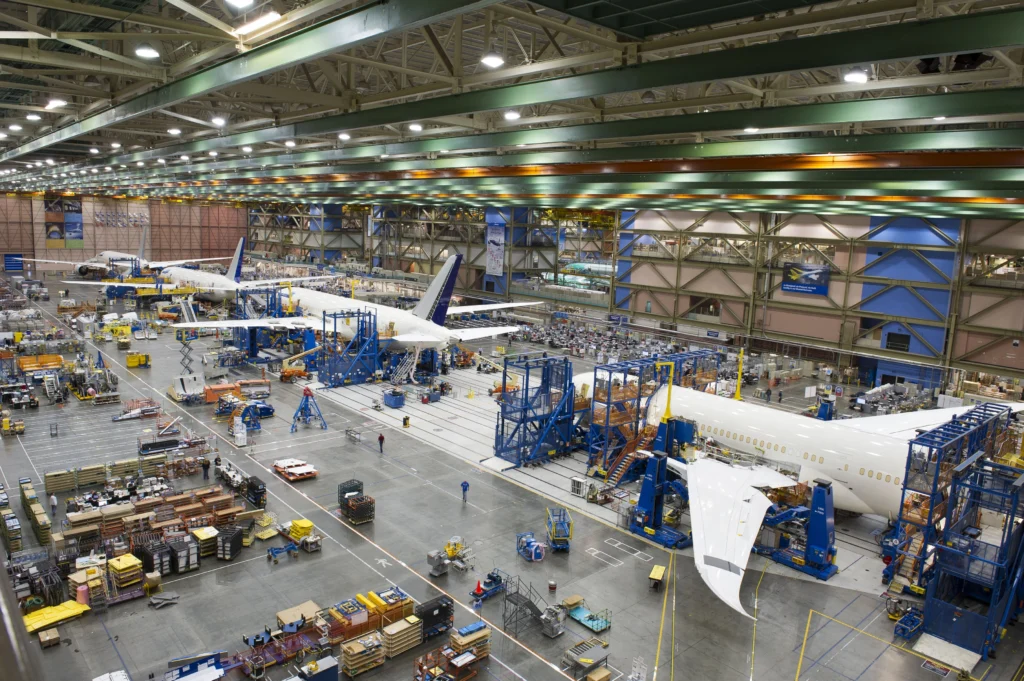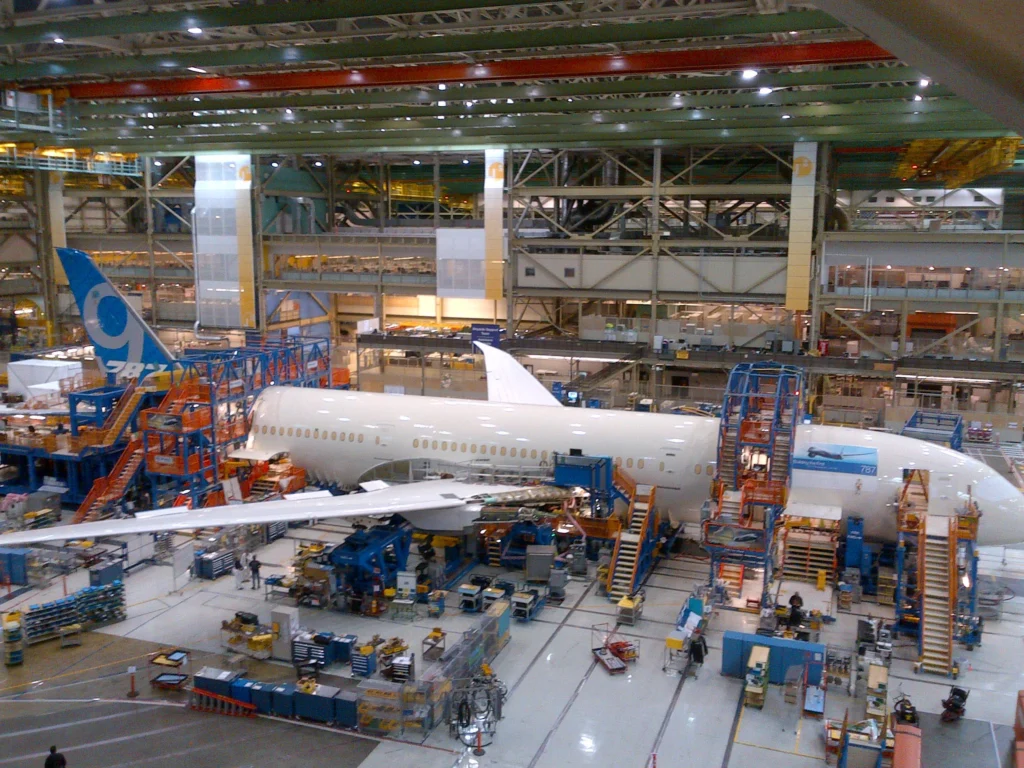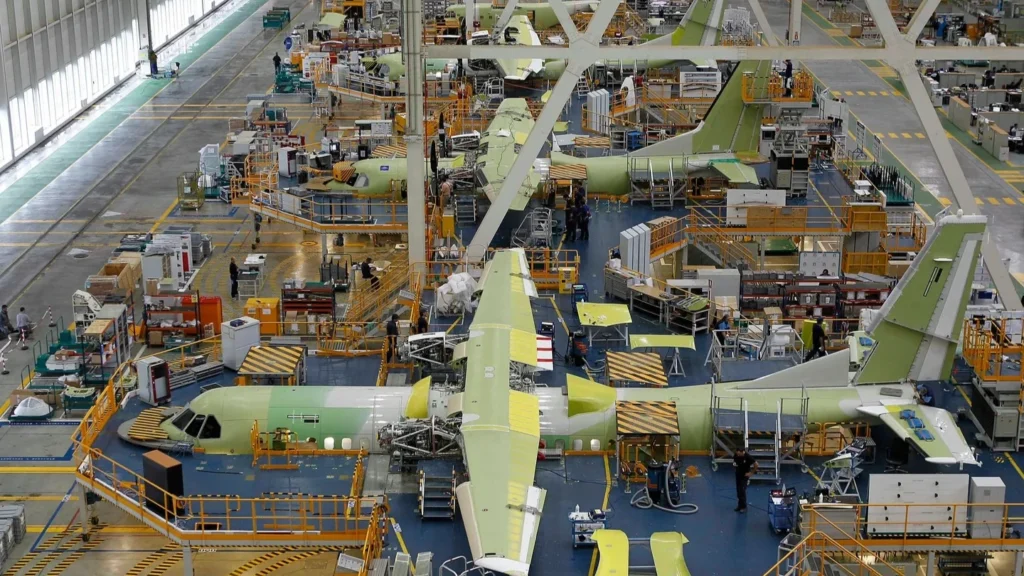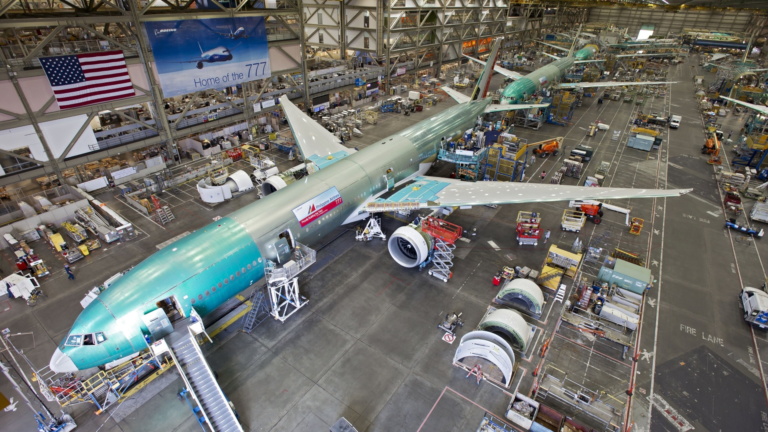SEATTLE- Boeing has signaled significant reservations about establishing a final civil aircraft assembly line in India, emphasizing that the current market conditions do not justify such a substantial investment.
The company’s India and South Asia president, Salil Gupte, articulated that the business case for final assembly requires a substantially larger market footprint than India’s current aviation landscape.

Boeing India Assembly Line
Speaking with Reuters during the Aero India show in Bengaluru, Gupte underscored the complexity of initiating a final assembly operation.
He stressed that the volume of aircraft required for commercial plane assembly far exceeds present Indian market demand, necessitating a more comprehensive regional market strategy.
The aerospace giant maintains a strategic commitment to India’s aerospace sector, having previously offered to assemble defense aircraft like the F/A-18 jets. However, Boeing distinguishes between defense and commercial aircraft assembly, noting that commercial airplane production demands significantly higher volume and a more robust economic rationale.
This stance comes despite recent optimistic statements from Indian government officials. Prime Minister Narendra Modi previously suggested that India would soon see Boeing aircraft designed and manufactured within the subcontinent.
The civil aviation minister had also expressed expectations for international plane makers like Boeing and Airbus to manufacture aircraft domestically.
Boeing’s cautious approach is grounded in market realities. Indian airlines, including Tata’s Air India and IndiGo, have approximately 1,800 aircraft on order and are scheduled to receive 130 jets this year. However, the company believes this volume remains insufficient to justify a dedicated final assembly line.

Seeks Strategic Incentives
Boeing projects a substantial expansion of commercial aircraft in the Indian and South Asian markets, anticipating 2,835 new aircraft additions over the next two decades. This forecast represents a four-fold increase from the current fleet composition, signaling the robust potential for aerospace development in the region.
Salil Gupte, Boeing’s India and South Asia president, emphasized that final aircraft assembly constitutes less than 10% of an airplane’s total value proposition. He highlighted that the substantive economic value lies in the comprehensive processes leading to aircraft production.
The company’s current engagement with the Indian market is already significant. Boeing sources products and services valued at $1.25 billion annually from a network exceeding 300 Indian suppliers.
Additionally, the company maintains a workforce of approximately 7,000 employees within the country and operates a joint venture with Tata Group, producing AH-64 Apache helicopter fuselages and 737 aircraft vertical fin structures for global customers.
Gupte advocated for strategic government interventions, specifically calling for incentives targeting suppliers to reduce capital costs. This approach aims to facilitate the expansion of India’s aerospace supply chain infrastructure.
He noted productive discussions with the civil aviation ministry, indicating openness to collaborative policy development across governmental departments.

Tata and Airbus India Assembly Line
Airbus and Tata Advanced Systems Limited have established India’s first private-sector aircraft manufacturing ecosystem through the C295 program. This groundbreaking collaboration will enable the Indian Air Force to receive domestically assembled C295 aircraft starting in 2026, with potential global export opportunities.
The partnership involves manufacturing 56 C295 aircraft, marking Airbus’s inaugural complete production line outside its home countries. This strategic move positions India as the world’s largest C295 operator, signaling a transformative moment in the nation’s aerospace manufacturing landscape.
The collaboration aims to extend production beyond domestic requirements by exploring international export markets. This strategic approach could transition India from a major aircraft importer to a significant aircraft exporter, challenging the country’s traditional aerospace industry dynamics.
While India currently lacks a major commercial airliner production line, the government actively encourages global manufacturers like Airbus and Boeing to establish domestic final assembly facilities. The substantial aircraft order of over 1,200 planes by Indian airlines presents a compelling economic rationale for such investments.
Discussions are underway to develop a passenger variant of the C295, with potential interest from Air India to enhance regional operations. The aircraft’s versatile design enables it to modernize the Indian Air Force’s capabilities by replacing outdated Avro transport aircraft and supporting military and humanitarian missions across diverse geographical terrains.
Airbus currently maintains final assembly lines in China, Canada, and the United States, while Boeing primarily produces aircraft in the United States with global parts production facilities. The C295 collaboration represents a significant advancement in India’s defense manufacturing capabilities and creates substantial opportunities in the international aerospace sector.
Stay tuned with us. Further, follow us on social media for the latest updates.
Join us on Telegram Group for the Latest Aviation Updates. Subsequently, follow us on Google News

